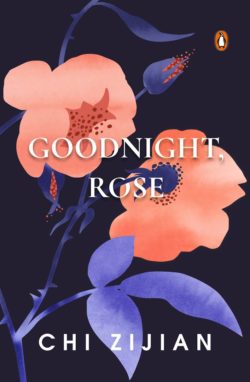Goodnight, Rose by Chi Zijian
Translated by Poppy Toland
Penguin Specials, 2018
Publisher's Blurb
Ji Lianna passionately tends to her flower garden and avoids looking back at her life with remorse. Xiao’e does not know the first thing about plants and cannot stop thinking about her past.
Eighty-year-old Ji Lianna is a child of the Jewish diaspora, and young Xiao’e is not sure whether she is human at all. The two women could not be more different. Yet, in a numbingly cold Harbin flat in an old Russian villa, an unlikely friendship blossoms between them. Soon their dark histories come back to haunt them as they realise they have more in common than just a shared address.
Reading Chinese Network Reviews
Reviewed by Michelle Deeter, 25/7/19
 Goodnight, Rose by Chi Zijian was an excellent read. My only complaint was that it ended too abruptly. The story is totally absorbing and the characters feel like real people. The story manages to be relatable while still portraying the unique elements of Harbin. I thought of my own struggles trying to find a place to rent when I lived in Belgium, as the protagonist, Zhao Xiao’e, tries to find an affordable place with her meager salary. When the story touches on World War Two history, I was shocked to learn that the Fugu Plan actually happened. I would have never read about that without reading this book. By the end of the story, I wanted to learn more about Harbin and wished I could meet some of the characters in person.
Goodnight, Rose by Chi Zijian was an excellent read. My only complaint was that it ended too abruptly. The story is totally absorbing and the characters feel like real people. The story manages to be relatable while still portraying the unique elements of Harbin. I thought of my own struggles trying to find a place to rent when I lived in Belgium, as the protagonist, Zhao Xiao’e, tries to find an affordable place with her meager salary. When the story touches on World War Two history, I was shocked to learn that the Fugu Plan actually happened. I would have never read about that without reading this book. By the end of the story, I wanted to learn more about Harbin and wished I could meet some of the characters in person.
Goodnight, Rose traces the life of a lonely woman named Zhao Xiao’e. A friend at work introduces Zhao Xiao’e to Ji Lianna, a Jewish woman who is somewhat set in her ways. The old lady has no interest in taking a tenant, and refuses to take on someone who snores, comes home late, or eats pork frequently. When Zhao Xiao’e first meets Ji Lianna, she suddenly thinks of her dead mother and bursts into tears. Here, Ji Lianna shows her compassionate side, gently giving her advice and offering the room as a short term arrangement. At first, both women have trouble adjusting, and they argue about all manner of things, such as whether to hang up laundry on the balcony or not. But gradually, they form a symbiotic relationship, where Lianna helps young Xiao’e dress more fashionably and Xiao’e runs to help Lianna whenever she is sick. Though they come from different backgrounds, they are able truly listen to each other and be supportive.
Too many Chinese stories are told in the first person and end up rambling, bragging, or simply trying to shock the reader. While this book is told in the first person, Chi Zijian manages to fully develop all of the characters in the story, and I was not bothered by the fact that the story was told in the first person. The setting is expertly portrayed as well. The city where everything takes place, Harbin, is described just as well as the inside of the villa where Xiao’e finally finds a room to rent. That’s what set this book apart—it is brief but filled with intriguing descriptions. Most importantly, the translation is excellent. Xiao’e is not very pretty but she can toss a stinging barb when she feels like it. As a result, the translation of dialogue is crucial to the success of the text, and Poppy Toland handles it with ease.
The start of the book reminded me of "Saint Marie" by Da Si (translated by Caroline Mason and available for free on Paper Republic) because both stories involve a prim landlady and an outsider tenant. However, compared to "Saint Marie", the relationship in Goodnight, Rose is characterized by mutual respect and empathy. Other parts of the novel reminded me of A Tree Grows in Brooklyn by Betty Smith, although Goodnight, Rose is less dark and the protagonist avoids her family as soon as she is able to live independently.
I would recommend this book to just about anyone, regardless of gender, age, or knowledge of China. The story and the dialogue are engaging, the translation is top notch and the book even passes the Bechdel test. It is one of my favorite books I have read this year.
Reviewed by Michelle Deeter
Reviewed by Bing Wang, 19/5/19
 Good Night Rose is tricky. I say this because its writer Chi Zijian has blended in a bit of the history of the Jewish immigrants in China, and because this was my original motivation to read this book. Not feeling completely disappointed in the end though.
Good Night Rose is tricky. I say this because its writer Chi Zijian has blended in a bit of the history of the Jewish immigrants in China, and because this was my original motivation to read this book. Not feeling completely disappointed in the end though.
It is a story of the loves and hates of two women, Ji Lianna, a Jewish descendant in her eighties who lives in Harbin and Xiao-e, a young village girl who works in the same city. Though Harbin is not Chi’s hometown, her portrait of this place tickles my fancy. The street, the houses, even the factory, are laid in front of me with lively details. I have also learned one or two new brands of printers that satisfied my curiosity.
Chi apparently spends more time on the characterisation of Xiao’e than Ji Lianna. Her life contains more adventurous elements. As a young village girl, Xiao’e has grown up to be feisty and brave enough to make a thief beg and help her future boyfriend Qi Deming retrieve his stolen stuff. When I thought, ah, another love story, but a few moments later, the scenery changed completely. Xiao’e was telling us about her childhood and prepared us for her transformation. Her character is like an onion which awaits peeling. By contrast, Ji is not treated equally although the highlight of the story is the similarity of the two women. Due to her old age, it seems that there may not be much for her in a fast moving world. She is elegant and calm as always, far removed from those who fight blindly to get themselves fed. Xiao’e somehow is the opposite but they both project an image of women being independent and strong.
Chi may hope to make all her female characters confident and powerful. The second landlady of Xiao’e, Liu Qin, for example, though deaf, is determined to make her own choice to marry Song Xiangkui, the second boyfriend of Xiao’e. However, I somehow still feel that Chi does not escape from the traditional value of underestimating female’s roles compared to men. Or maybe her intention is to moan about this inequality. In this story, none of the female characters can really control their own lives. I do not mean that they can’t make choices for themselves. It is their dependency on men creeping into the story that makes me think this way. On the other hand, they desire love because the society treats them as objects no matter at which point of history. Women are still required to be submissive to men. It is unfortunate that even women themselves continue to internalise this value. Having learned from this novel, I feel that there is still a long way to go for women to finally have their say.
In terms of the Jewish community in China, it is positive that Chi mentions them in the story, even though this is just to add an exotic feeling to distinguish itself from other urban-setting stories. The Jewish immigrants are invisible in China. It is not clear how their lives are after moving to China. A disappointment for Ji may be that there is no other Jew who can communicate with her in the story. She prays alone, goes to the synagogue alone and dies alone. The Jewishness has been subsumed into the salvation that Ji and Xiao’e are looking for. Thus, it can be replaced with any other religion or faith system.
My enjoyment of reading this novel can also be attributed to the translation of Poppy Toland. She has captured the beauty and sensitivity of Chi’s writing with her own witty choices of words. If anything, her translation adds another value to Chi’s work to make it funnier and more uplifting.
Reviewed by Bing Wang
Reviewed by Cat Hanson, 22/11/18
 This novel seemed to be over as soon as I had started it. That’s not a criticism at all – rather, it was an enjoyable, compact read, mostly because it was well-paced, and following just a small set of well fleshed-out characters, each with their own small idiosyncrasies threaded throughout the story. Our stage is mostly set with two characters – Xiao’e, a young newsroom professional from a southern village, and her elegant, elderly landlord Li Jianna, a member of the Jewish community in Harbin. It was a change of pace to move away from usual contemporary spaces of office dramas, city backstreets, and gritty hotels into the living room of Li Jianna, complete with piano and refreshments.
This novel seemed to be over as soon as I had started it. That’s not a criticism at all – rather, it was an enjoyable, compact read, mostly because it was well-paced, and following just a small set of well fleshed-out characters, each with their own small idiosyncrasies threaded throughout the story. Our stage is mostly set with two characters – Xiao’e, a young newsroom professional from a southern village, and her elegant, elderly landlord Li Jianna, a member of the Jewish community in Harbin. It was a change of pace to move away from usual contemporary spaces of office dramas, city backstreets, and gritty hotels into the living room of Li Jianna, complete with piano and refreshments.
Having read a few novels set in Guangdong or Hong Kong, it was a change to suddenly be transported to the biting winters of Harbin, with author Chi Zijian’s on-target descriptions of ‘creamy yellow reflections of street lamps’ and a bitter chill that ‘forces you into a mall or cinema to seek warmth’. Even the city’s famous ice cream gets its own well-deserved mention. Li Jianna’s high-ceilinged home seems to act as a haven against the bitter, snow-carpeted city outside. Furthermore, I noted that once Harbin was flooded with the light of summer, so too was Xiao’e exposed to the true stories behind both her own life and Li Jianna’s, once the snow had melted away.
As someone who personally enjoys reading backstories, I enjoyed the chapters where Chi details the upbringings, love and loss of both Xiao’e and Li Jianna. While this method of absorbing a character’s history in one big chunk isn’t for everyone, I feel it turns the book from an intriguing storyline to a page-turner. I often wanted to find the conclusions to the clues that Chi leaves us throughout each scene: for example, Li Jianna’s desire for a lodger, or Xiao’e’s traumatic memories of her upbringing.
While many contemporary novels seek to hide a clever lesson behind the plot or characters, I didn’t get that feeling from Goodnight, Rose. For example, I was a little surprised by Xiao’e’s darker decisions towards the end of the book. Her motivations are clear, but it seems out of place for a character that has previously been confused at her friend’s anger and desire for revenge, but perhaps that seeks to emphasize her change in perspective. Although I did not expect Xiao’e to forgive the character in question, and it may have been a character development for Xiao’e, I felt as if her vengeful plot and the catastrophic results that followed seemed to rush into the storyline without any footing, as if the setting and backdrop crashed down all of a sudden and production was over. Still, I enjoyed the length of the book, which didn’t drag out any conversations or storylines as others sometimes do, and all loose ends were tied up, if some not a little hastily.
The book wouldn’t of course have been so speedily read by myself were it not for the seamless translation of Poppy Toland. Each chapter read smoothly but without trampling over cultural nuances. For example, Xiao’e refers to Li Jianna as ‘granny’ which may be a surprise for those readers not used to using ‘granny’ as a polite way of addressing an older friend, however it does seem to be more fitting than if it were translated to ‘Ma’am’ or a similar English-language honorific.
In conclusion, I enjoyed this book for its unique characters and detailed storyline, although the ending left me a little surprised and searching for a hidden meaning. Perhaps there isn’t one, and I have become accustomed to each story needing to say something. Perhaps not every novel needs to have the moral of the story written in black and white, rather, we can make of it what we will.
Reviewed by Cat Hanson
Reviewed by Catherine Shipley, 11/11/18
 I felt a little muddled at the beginning of the book. I had to focus hard to keep track of the different characters and the chronology of the events, as well as trying to digest elaborate descriptions, such as that which likened a building to, 'a fawn tiptoeing up to the edge of a lake to drink: young and clumsy, charming and playful.'
I felt a little muddled at the beginning of the book. I had to focus hard to keep track of the different characters and the chronology of the events, as well as trying to digest elaborate descriptions, such as that which likened a building to, 'a fawn tiptoeing up to the edge of a lake to drink: young and clumsy, charming and playful.'
Goodnight Rose, felt at times a little far-fetched, at others like an intimate recounting of a real life. After the first few pages, once I had settled into the story, I was thoroughly absorbed by it. Having been carried away by the narrative, the ending came suddenly, out of nowhere.
I was left feeling muddled again, in an emotional way. I instinctively wanted a simple conclusion to the goings on in the book; were certain characters inherently good or inherently bad, when all was said and done? Was Xiao'e, the main character, naïve or wise after all? As in life no neat, easy summary was presented. The reader was left to mull over all they had seen and try to make sense of it in their own way. I really appreciated this - it left me enjoying reflecting on the story almost as much as I had enjoyed reading it.
In my opinion, Goodnight Rose, is unique in many ways. Set in Harbin, the atmosphere of the city seeps into the narrative; the extreme weather conditions, the wonderful architecture, the Songhua river, Sun Island and, of course, the Jewish and Russian influence. The way in which flowers feature throughout the narrative is intriguing, adding a poetic, melancholic quality to those moments. Xiao'e, an orphan from a poor village, makes a life for herself in the big city, moving from one rented property to another. Her life starts to find more meaning once she moves in with Ji Lianna, a glamorous elderly Jewish lady, who is generous, set in her ways, yet mysterious too. The relationship between Xiao'e and her landlady is very believable in its complexity, it changes the longer they live together, through the ups and downs that such a setup is bound to have. Xiao'e is a capable, independent, young woman. We witness this just as we witness her moments of self-doubt. It is frustrating to watch her sell herself short, no matter how common such behaviour may be in real life. Although it is not the focus of the book, we can't ignore the glaring inferiority of the female characters, who are each destined to mistreatment of one kind or another. In this harsh reality they nonetheless attempt to find happiness.
The beauty of Goodnight Rose also stems from the dream-like world in which Ji Lianna resides. She lives life in such a way that allows her to escape from modern reality, instead taking comfort in the routines of her past. This is partly what comforts Xiao'e in difficult times. Whether or not the past was as glorious as Ji Lianna believes is gradually revealed to Xiao'e. The discovery of each other's histories adds a new dimension to their friendship.
Goodnight Rose offers us the chance to become immersed in life experiences from different eras, based in a city that is a key part of the story in itself. This special opportunity should not be missed.
Reviewed by Catherine Shipley
Reviewed by Tamara McCombe, 29/10/18
 This is one of the most pleasant reads from a contemporary Chinese author I have read in quite some time. So much literature currently translated from China’s mainland writers in to English is pastiche - forcefully black, crude and often feeling like the author has an axe to grind. Goodnight, Rose by Chi Zijian is available from Penguin and has been masterfully translated by Poppy Toland.
This is one of the most pleasant reads from a contemporary Chinese author I have read in quite some time. So much literature currently translated from China’s mainland writers in to English is pastiche - forcefully black, crude and often feeling like the author has an axe to grind. Goodnight, Rose by Chi Zijian is available from Penguin and has been masterfully translated by Poppy Toland.
Although the narrator is the young woman Zhao Xiao’e, we the reader are swept into the lives of each and every character that enters in and out of her life. We cannot help but empathise for each of them despite their faults, or maybe it is their human faults that make us so care about them.
Zhao Xiao’e is the product of her mother’s rape and is repudiated by the paternal side of her family. Once her mother dies and her brother marries into a family in another village she self-exiles herself to Harbin where she works as a proof reader for a newspaper. She changes rental properties as often as she does boyfriends until by a stroke of luck she finds herself living with an elderly Jewish lady called Ji Lianna. Although they come from different cultures and generations as the story unwinds their pasts have an awful lot more in common than they first realise.
The passing of time is gently portrayed through the change of colour and description of flowers. For instance, we read that “Spring did not arrive properly in Harbin until the lilac flowers blossomed. Spring jasmine and peach blossom opened before the lilac, competing to be the first flowers to herald the spring.” Whilst grappling with her own feelings of revenge for her mother’s attack, Zhao Xiao’e acutely dissects the emotions and their causes experienced by her fellow characters, acting almost as a gentle psychologist.
Much contemporary Chinese writing currently translated attempts to be impactful by bombarding readers with shocking event after gruesome moment. In Goodnight, Rose however, the reader is equally struck by one single act committed by Zhao Xiao’e which would seem so at odds with her character.
Toland’s translation is quite simply fantastic and prevents any humour from the original text being lost. When Zhao Xiao’e’s friends attempt to matchmake her with a young man, with a deadpan turn of phrase she retorts “I didn’t even know which department Wang Ke studied in or what his major was, but as soon as I heard his name, I shook my head, saying if I were to marry him, that would make me Mrs Wanker, and I really couldn’t stand for that!”
Another reason why I found this book refreshing was because the subject matter and setting takes us away from the so often used backdrop of Beijing, Shanghai or Guangzhou. The author is from Mohe in Heilongjiang, the same province as Harbin where the story is set. Zijian deftly weaves historical facts and people from Harbin’s connection with Jewish settlers to the China of here and now. Her sensitive descriptions of Zhao Xiao’e’s countryside hometown village are most likely supported by her own rural upbringing.
Pessimists might suggest the author’s lack of social criticism comes from the fact that she is a government paid author. Sometimes you just want a good story and have no need to be pulled into uncomfortable places. There is no questioning this is a well composed piece of literature, no matter what language it is written in.
Reviewed by Tamara McCombe
